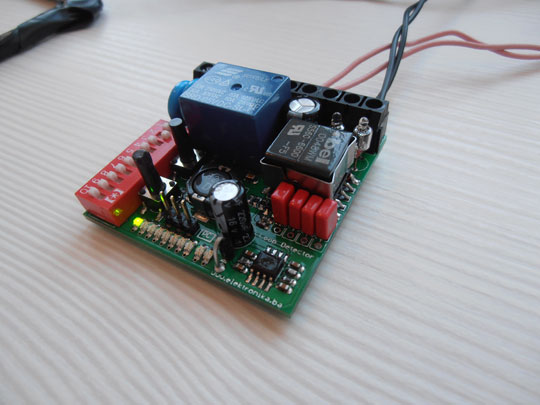[Trax] was asked by a friend to build a device that could detect the presence of a car in front of his garage gate for it to open automatically. After searching the web for such a project and trying many of them, he decided to build his own detector based on an induction loop. As you may have guessed, this kind of detector works by detecting an inductance change in a wire loop (aka coil) buried in the road. Having a car pass several inches on top of it produces such an effect.
[Trax]’s write-up shows a very well thought and professional design. All the detector parameters can be adjusted using DIP switches and buttons: detection type (presence/pulse), signal filtering, main frequency and sensitivity. The wire loop is isolated from the main sensor electronics using a 1:1 isolation transformer and a Colpitts oscillator is used to drive the latter. Moreover, gas discharge tubes are also used for lightning protection.
The change in inductance translates to a change in resonant frequency which is later detected by the main microcontroller. The board is 24V AC powered and a diode bridge + LM2596 SMPS step-down converter are in charge of generating the required +5V in an efficient way.
As if this was not enough, [Trax] also made a PC-based tool that can change other platform settings using a serial connection. All the resources can be downloaded from his website and a few videos are embedded after the break.

















While I applaud those who build their own circuits, it’s a lot easier (to build AND maintain) to pick up a surplus loop detector used for traffic signals. They’re usually built well, don’t need a lot of tuning, and provide a relay contact that usually deals with 24V, which is generally what garage door openers use these days. It’s not hard to find these for well under $20. That being said, having this circuit powered BY the opener itself rather than another 120V plug is rather nice.
Please show us where you can get these surplus detectors for $20 I will buy them all day long
http://www.ebay.com/itm/ICC-Series-3DLD-Mdl-3803-Digital-Loop-Detector-/161171413597?pt=BI_Security_Fire_Protection&hash=item2586909a5d
http://www.ebay.com/itm/EDI-LM-301t-Traffic-Vehicle-Loop-Detector-Monitor-/161171420357?pt=BI_Security_Fire_Protection&hash=item258690b4c5
http://www.ebay.com/itm/TRAFFIC-SIGNAL-STOP-LIGHT-CONTROLLER-DIGITAL-LOOP-DETECTOR-MOD-910-/141241039135?pt=LH_DefaultDomain_0&hash=item20e29f391f
And that’s just 20 seconds of browsing.
I have about 300 of the surplus detectors that I bid on when the county dumped them and I would be so happy to get rid of them for $1 each (Atlanta GA area). I even have all the schematics and info on them. All different types.
(Nov07) If have any of those surplus detectors left now, please email me what would sell 3 for.
I can supply you with as many as you like for just postage. However, they are very heavy having steel cases. They are pulls so that means you might be able to make one that works out of 2 or 3 units. Contact me at mmoss at mindspring dot com.
Do you have any of the detectors
I am sorry to report that all 300 went to recycle a few months ago.
Do u still Have them
Sorry to report that these have been turned into surplus metal about 2 or 3 years ago. Whatever goes on the internet stays there forever, doesn’t it…..
9196287371..contact me, I’ll take some off your hands
This works great for all cars, if you want selective add in a RasPi looking for bluetooth mac addresses. it can sense the car and the phones inside the car to only open for recognized mac addresses.
If you can detect the *right* bluetooth then do you even need the inductive loop detector?
If you don’t want the gate to crush your car, you don’t. The inductive loop detects the presence of the vehicle. If the inductive loop is placed correctly, it will detect vehicle, open gate and keep it open until the vehicle clears the gate. Good practice dictates multiple loops and detectors in this situation.
Some might ask why anyone would go to the the trouble of making a loop detector, but this builder is on to something: the serial interface is a welcome addition. I know of no other gate purpose detector that offers such an interface (I’m not talking about traffic loop detectors, but parking or gate loop detectors)
Reno makes detectors with RFID or some sort of RFID built in. That would be interesting to see added a feature.
Something I’d like to see: use of three axis compass as vehicle v detection. Banner m-gage does this. Rather novel product, but not without it’s own issues.
You don’t want the garage door opening if you walk past it with your phone.
This is cool, but I’d need a much faster door opener motor than my current one for it to not be more annoyance than useful. I usually hit my opener 30-odd feet down the road from my driveway.
Good point.
Loop detector + Bluetooth +garage door transmitter = a mighty fine “almost secure” garage door opener.
99% of the work is in replacing the user pressing a button. The need for heavy lifting, and even getting out of the car, has now been removed by technology. We just haven’t quite cracked the last centimetre where the user has to actually press the button to start.
I’d stick with a button and call it “solved”. It’s the bit that’s hard work and more likely to damage something when it goes wrong.
I was loving this project right up until, “by the main microcontroller” Bah… If you’re doing some good analog, why muck it up with a uC? He could have easily used some peak detection and RC circuit to drive a comparator to detect the change. Then a simple timed latch (I’d let him get away with a 555.) to run the relay.
Am I being a bit picky? probably. I just feel it strange to do all that wonderful work and then cop out on the last stage with a uC. At that point, why not just generate the signals with uC, and skip the oscillator?
By using uC you get more flexibility and configuration parameters. With analog you would get only detect/undetect. Implementing all these parameters mentioned in this project with just analog would be ridiculous :-)
I like what I see and can see good uses for this. Unfortunately it looks like it could be a bit pricy for everyday use and not at all weather proof. Where can I get this and for how much?
You can build one yourself. All details are on the project page including firmware. You can put it in a waterproof plastic enclosure :-)
Would this be sensitive enough to detect bikes passing by?
NEED IDEAS: Motorcycle Detection – I have a related problem to solve. The parking garage where I work has an magnetic loop detector for vehicle detection. My mid-sized ‘sport touring’ motorcycle is not small as MCs go, but frequently it is not detected. Then my NFC badge will not work and I’m stuck on a parking ramp. Unacceptable and annoying.
I can see the lines on the the concrete for the buried wire for the vehicle loop detection. Even when I roll directly over the wire, triggering the loop is chancy, 50/50. Because the garage refuses to calibrate I am obligated out defiance to defy the system design. You know what I mean!
I have been considering options to trigger the induction loop more reliably.
1. Strong Neodymium Magnet – High gauss rating magnet – under bike
2. Iron plate under the foot-pegs. Maybe stick some Neodymium magnets on it.
3. Build a 12V induction coil, run off MC battery, button on handlebars. Wrap copper wire around PVC perhaps. But, knowing or being able to tune a proper frequency would help.
What other ideas does our community have that might do the job?
I presume your loop is laid to detect cars owing to the physical dimension. I have noticed loops to detect motorcycles in a rectangular shape and just about the size of the motorcycle. Will you be able to lay a new loop – smaller in size?